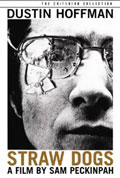
Directed by
Sam Peckinpah
118 minutes
Rated MA
Reviewed by
Bernard Hemingway

Straw Dogs
Peckinpah's follow-up to his bench-mark revisionist Western The Wild Bunch was not critically well-received at its time of release. Based on a novel The Seige of Trencher's Farm by Gordon M. Williams, its treatment of violence departs from the comfortably legitimating context of the Western but sets up a familiar enough paradigmatic opposition between the civilized, represented by a mild-mannered American academic, David Sumner, played by Dustin Hoffman, who comes to a small Cornish village on study leave, and the uncivilized, in the form of a gaggle of uncouth, booze-sozzled local yokels who both resent him as a poncey outsider and lust after his sexy young wife (Susan George), in what is a kind of test case of the familiar "what would you do if...." scenario out to people who maintain a pacifist position.
Peckinpah, however, is more than simply using this set-up as a pretext for some vicarious thrills, which, let's face it, is the standard modus operandi of innumerable inferior Hollywood films (which get a nice little swipe in David’s telling the yokels that his only contact with violence in America had been “”between the commercials”). Although the directgor was castigated at the time as merely indulging in an orgy of violence (it is, however, tame by today's standards) and dubious machismo, Pekinpah does more than that, going to some trouble to demonstrate the conflicting pressures of the civilized and pre-civilized in any social situation.
Ultimately, and characteristically enough, Peckinpah appears to be acknowledging the presence of violence in the male psyche rather than endorsing it. After Hoffman has killed the yokels (with the help of his wife) and saved the village simpleton, apparently liberated from his emasculatory home life, he drives the latter back to the village. Along the way the latter says "I don't know my way home". "That's all right," replies Hoffman, "neither do I", giving us a wry smile. Does this mean that our once-mousey intellectual has transmuted to the plane of liberated manhood through purifying bloodshed? Such appears to be Peckinpah's Neitzschean conclusion. Whether one agrees with Peckinpah's apparent position is another matter but as always with this director there is plenty of room for conflicting points of view.
The film also created controversy because of its rape scene, particularly the suggestion that the woman, at least in part, enjoyed it. Made at the height, so to speak, of the mini-skirt craze and in the wake of the sexual permissiveness of the 60s, David's wife Amy is portrayed as an at-best naïve young woman whose use of her sex appeal drives the socially-backward yokels to a frenzy of moralizing prurience. As an allegorical reflection (the various dramatic elements are too strident to be viewed realistically) on the relationship between sex and violence and the social constitution of male and female identity Straw Dogs does not rely entirely on simplistic oppositions, allowing for many counteringvailing considerations.
Although today most discussion about the film centres on its moral position, Straw Dogs is also a very well-made, steadily building to its worm-turning climactic conclusion. Hoffman is in some respects an odd choice for the role as of a timid intellectual, and a George Seagal or Donald Sutherland would not have have carried the burden of the distinctive drawl which he uses to such good effect with his typically more eccentric characters. The ill-matched relationship between his character and that of the Susan George character also needs to be taken at face value as it gets no real development on screen.
Straw Dogs is not Peckinpah at his best but it is nevertheless an interesting film on many levels.
Want something different?





